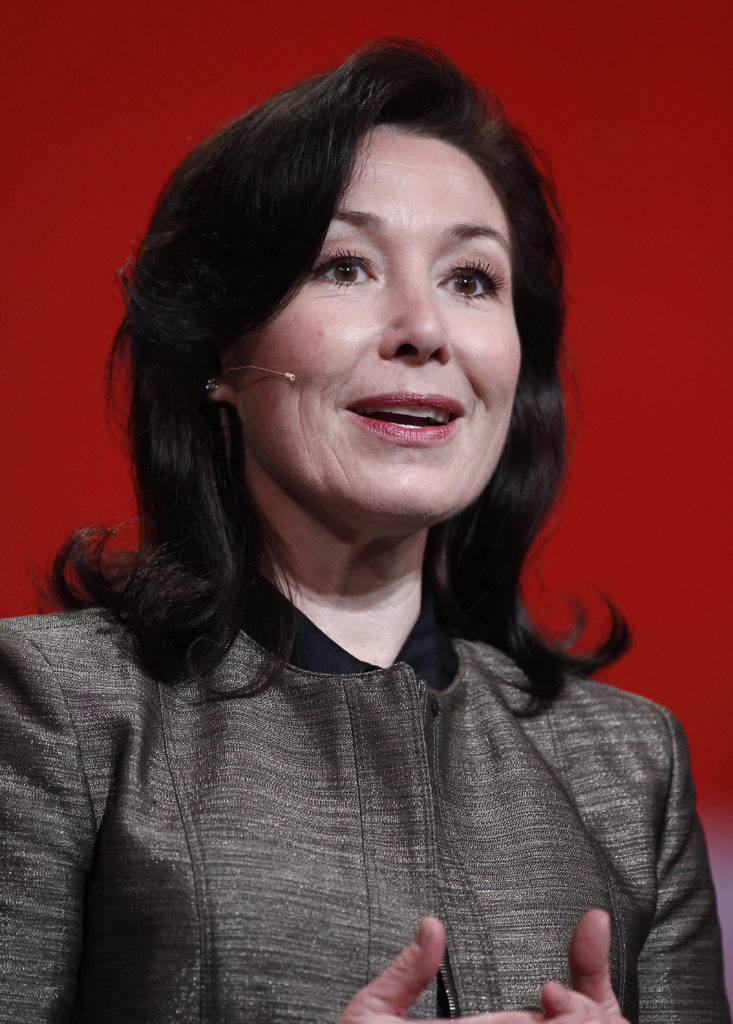Safra Catz, one of only 61 self-made female billionaires in the world, who make up less than 3% of the billionaires on the list, is continuously solidifying her position as a pinnacle of influence in business.
Safra recently debuted on Forbes’ definitive ranking of the wealthiest people on earth with a net worth of $1 billion. Though she owns less than 1% of the Oracle Company, her option grants, which form the majority of her fortune, have pushed her to the top 1% of the world. But, how did Safra set herself up to be named one of the most powerful pillars of success in the business world?
In September 2014, it was announced that Safra Catz, former co-president and CFO of Oracle had been promoted to co-CEO of Oracle, the world’s leading supplier of information management software and the world’s second largest independent software company. The move was announced after the company’s famous founder and CEO, Larry Ellison, declared he would be taking the executive chairman position.
Frequently in the shadow of Ellison’s big personality, quiet leadership has been part of Safra’s reputation in the corporate world, particularly during her time at Oracle. However, according to former Chi Omega National President Melanie Maxwell Shain, who served as a chapter advisor while Safra was a Chi Omega collegian, quiet leadership was part of her disposition during her college years, as well.
“Safra was a very focused young woman unceasingly working towards her goals. She approached her academic pursuits with tremendous intensity. While living in the Chi Omega house, she didn’t hold a major leadership position in the chapter, but she always there as a good, supportive member. Safra was driven to achieve the greatest benefit from her scholastic opportunities to prepare her for her future goals.”
So how did this quiet leader go from Chi Omega chapter member to earning the title of World’s Highest-Paid Female Executive?
Safra was born in Israel and moved to a suburb of Boston, Mass. when she was six. Her father worked as a nuclear physicist at MIT while her mother worked as a speech therapist in public schools in the Boston area.

Safra Catz, then co-president and chief financial officer and now co-CEO of Oracle Corp., speaks during the Oracle OpenWorld 2011 conference in San Francisco, California, U.S.
After graduating from Brookline High, Catz studied business at the University of Pennsylvania, where she was an active member of the Beta Alpha Chapter of Chi Omega, and also played on the school’s fencing team. (A former coach of hers once laughingly described her as having a “combative personality.”) After earning her undergraduate degree, Catz earned her Juris Doctorate from the University of Pennsylvania, as well.
Despite earning her law degree, in the early 90’s, Catz went to work on Wall Street as an investment banker – a decision that would change her life.
In an interview in 2005, Safra revealed, “My best decision was to choose to go to Wall Street over law. I learned a lot and focused on the expanding software industry at a time when the independent software industry was just beginning. That ultimately brought me to Oracle. “
Her knack for numbers is a trait that’s unveiled itself on many occasions at Oracle.
“I come from Wall Street, and you’ll never see me do a PowerPoint because I’m all about Excel spreadsheets…If it’s not in the numbers, I don’t care how strategic it is, it doesn’t play out,” she had said.
In 1997 she requested a transfer to Silicon Valley, in an effort to be closer to her customers. She relocated to California, along with her husband, Gal Tirosh, and their two young children.
Catz joined Oracle in 1999 as senior vice-president, and within months of joining she was named an executive vice president. A mere two years later, in 2001, Ellison placed her on Oracle’s board, perhaps quieting any doubters that Catz held real power at Oracle. In 2004, she became a co-president. From November 2005 to September 2008 Catz was appointed as interim CFO, only to return as full-time CFO in 2011.
However, according to those who know her well, her title never has been particularly meaningful. Her real job has been making sure the entire organization follows the policies that Larry Ellison sets.

Safra Catz, then co-president and chief financial officer and now co-CEO of Oracle Corp., speaks at the Oracle OpenWorld 2010 Conference in San Francisco, California
According to an in depth Forbes article published about her in 2009, a former Oracle executive described her as “sharp, inquisitive, and doesn’t suffer fools. People would say, ‘Well, Larry says,’ and she’d say, ‘Not to me he hasn’t.’ “
Despite her long service to the company, she remains a mystery in the business world, and she is something of a mystery even within the company. She rarely grants interviews, and when she does, they are typically business-related. Some theories as to why she avoids interviews hint that her training as an investment banker probably taught her to deflect attention to the client – in her case, Oracle’s popular former CEO.
The same 2009 Forbes article said, “Many of the executives she oversees know next to nothing about her. She shuns the limelight assiduously: Oracle’s own marketing department once struggled to persuade her to be photographed. The low profile masks her high impact.”
“What Catz wants for herself is anyone’s guess. If she has hobbies, she doesn’t blab about them at the office. She frequently hosts political fundraisers, but apparently does so in the bipartisan manner befitting the president of a company that gets a sizable portion of its revenue from the federal government. She also has shown a keen interest in Oracle’s philanthropic efforts, which she oversees.”
And, despite being named the twelfth most powerful female in business by Forbes in 2013, Safra remains humble… and frugal, occasionally being seen on a weekend shopping trip to Costco, her children in tow, like any other busy professional stocking up on her family’s needs.
The question begs: what makes Safra such a successful businesswoman? Could The Symphony possibly be inspiration for her work ethos? While the question remains, she certainly mirrors lines of our beloved Symphony in many aspects of her work.
To choose thoughtfully. In her rare interviews, she cannot overstate the importance of evaluating investments and decisions.
“I encourage you to also think very, very carefully when you’re making an investment decision that in fact that decision is really a need you’re filling that you believe in. Don’t just go with everybody else. Don’t just watch a PowerPoint like a dog watching television. Make sure it makes sense…The focus needs to be where you can add competitive value to your customer and have competitive advantage.”
To work earnestly.
When asked about Oracle’s success, she has said, “Unfortunately there’s no easy way to get there…Of course, time is money. But that’s the way to go – hard work, focus, and specialization, and then no one can catch you.”
To act sincerely.
“There’s an expectation that when you become a senior executive that you got there in part because you’re really listening. It’s very, very important to listen to your customers. They’re it. They’re doing you a favor by telling you what they think and you can’t get to this position without listening to the issues and engaging in creative problem solving, because that’s what this is really about.”
“Sometimes you have to take some blame for something that’s happened in the past and say, “I was wrong. That was a mistake.” And maybe it’s not you, but it’s your company, which means you’re responsible. I’ll say, “Okay, if that’s what we did, I’m sorry about that. Let me see how to make that right.”
To be womanly always.
“The most significant barrier to female leadership is the actual lack of females in leadership. The best advice I can give to women is to go out and start something, ideally their own businesses. If you can’t see a path for leadership within your own company, go blaze a trail of your own.”
“The biggest challenge for the next generation of women is to turn these generational expectations on their ear. Hopefully in the future generational challenges will be measured by achievement, not gender.”
To be discouraged never.
“The most important thing is to understand the goals and issues of the customers and work through them. Often hard work can solve most problems as well as some real willingness to try.”
Still, is Safra’s success what her former chapter advisor Melanie Maxwell Shain would have expected of her?
“Absolutely. Her tremendous achievements in her career are what I would have expected her to achieve. I am thrilled to see Safra so incredibly successful.”
